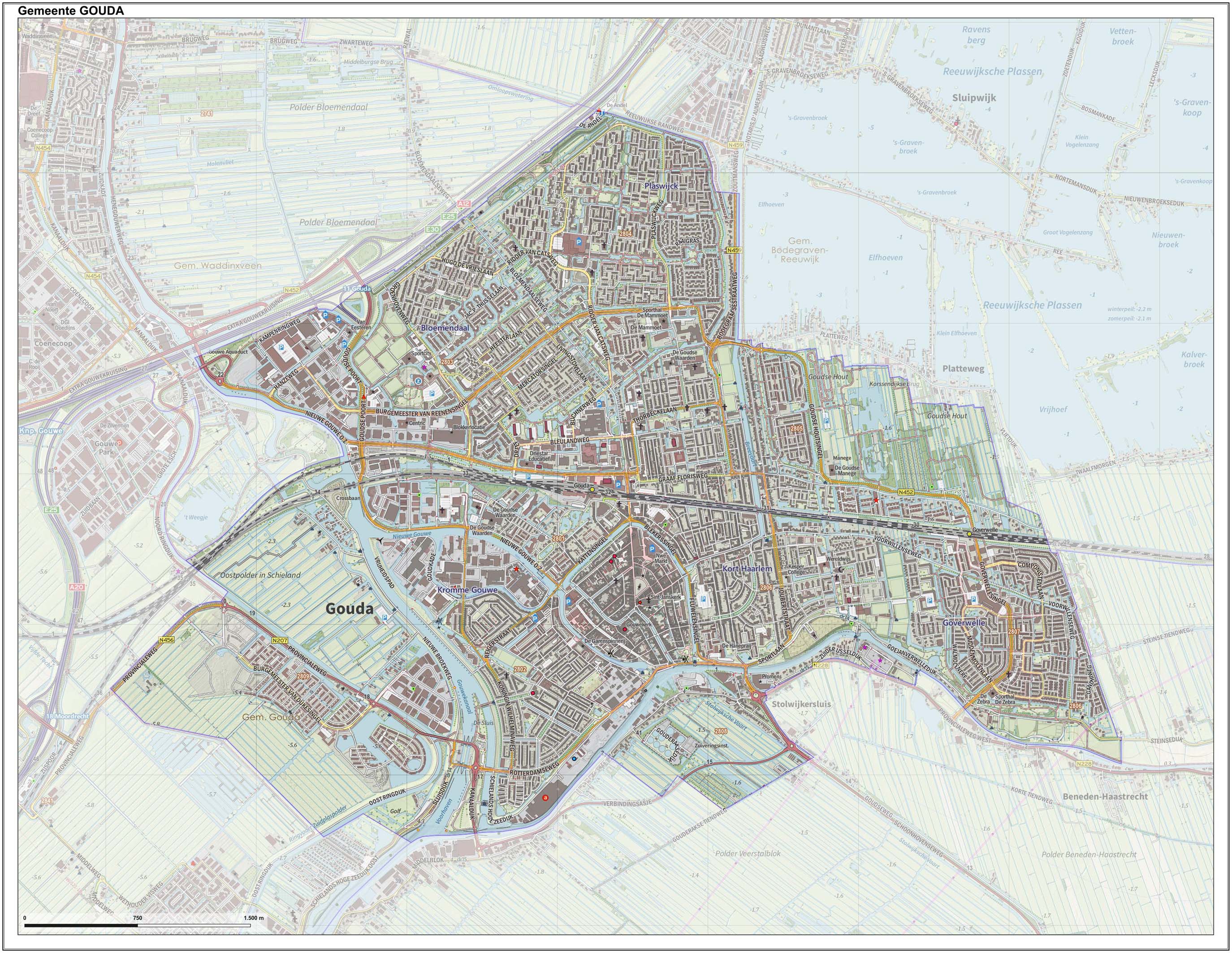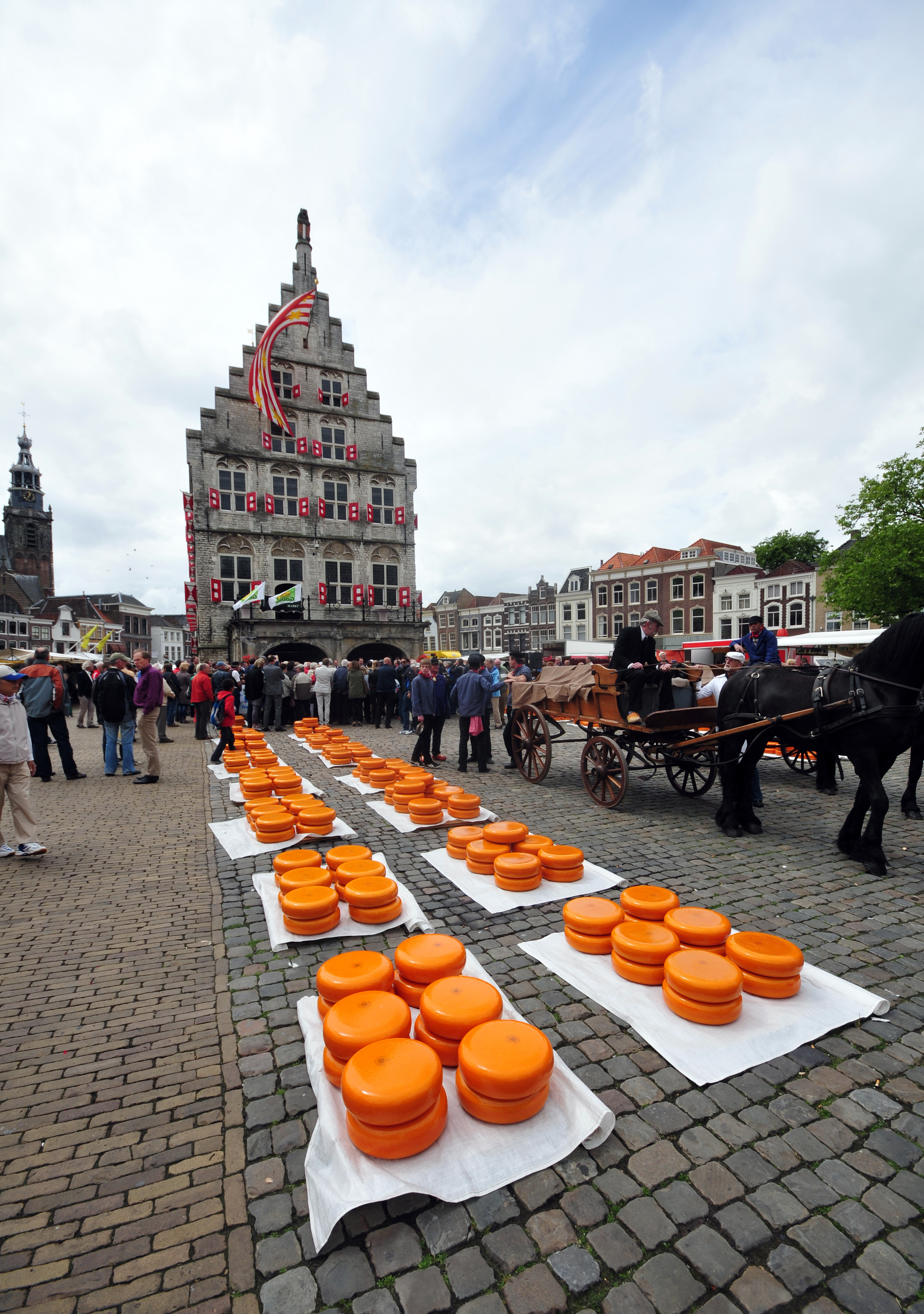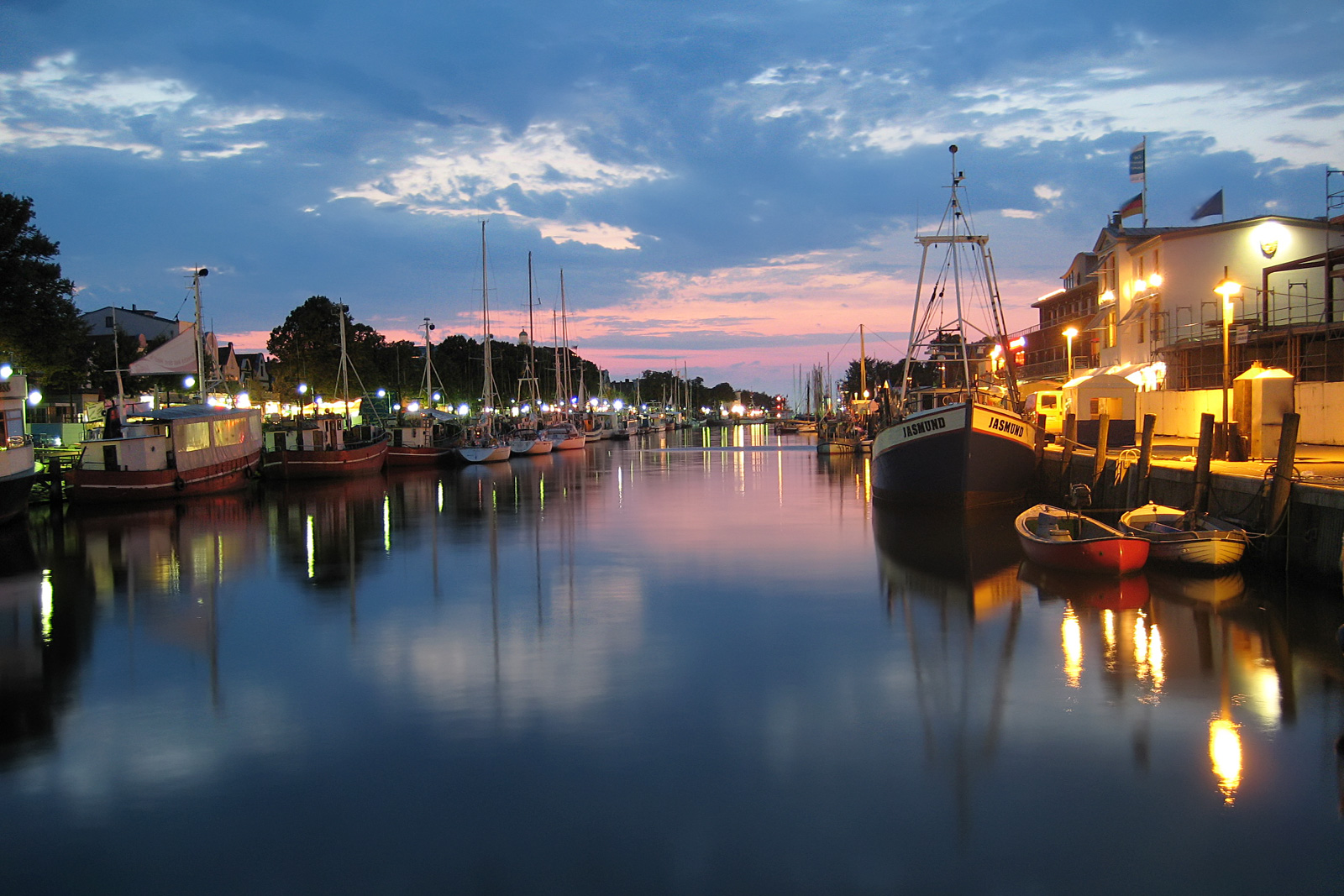|
Gouda, South Holland
Gouda () is a city and municipality in the west of the Netherlands, between Rotterdam and Utrecht, in the province of South Holland. Gouda has a population of 75,000 and is famous for its Gouda cheese, stroopwafels, many grachten, smoking pipes, and its 15th-century city hall. Its array of historic churches and other buildings makes it a very popular day trip destination. In the Middle Ages, a settlement was founded at the location of the current city by the Van der Goude family, who built a fortified castle alongside the banks of the Gouwe River, from which the family and the city took its name. The area, originally marshland, developed over the course of two centuries. By 1225, a canal was linked to the Gouwe and its estuary was transformed into a harbour. City rights were granted in 1272. History Around the year 1100, the area where Gouda now is located was swampy and covered with a peat forest, crossed by small creeks such as the Gouwe. Along the shores of t ... [...More Info...] [...Related Items...] OR: [Wikipedia] [Google] [Baidu] |
List Of Cities In The Netherlands By Province
There are no formal rules in the Netherlands to distinguish cities from other settlements. Smaller settlements are usually called ''dorp'', comparable with villages in English speaking countries. The Dutch word for city is ''stad'' (plural: ''steden''). The intermediate category of town does not exist in the Netherlands. Historically, there existed systems of city rights, granted by the territorial lords, which defined the status of a place: a ''stad'' or ''dorp''. Cities were self-governing and had several privileges. In 1851 the granting of city rights and all privileges and special status of cities were abolished. Since then, the only local administrative unit is the municipality. Regardless of this legal change, many people still use the old city rights as a criterion: certain small settlements proudly call themselves a ''stad'' because they historically had city rights, while other, newer towns may not get this recognition. Geographers and policy makers can distinguish betw ... [...More Info...] [...Related Items...] OR: [Wikipedia] [Google] [Baidu] |
Gouda Cheese
Gouda (, , ; nl, Goudse kaas, "cheese from Gouda") is a sweet, creamy, yellow cow's milk cheese originating from the Netherlands. It is one of the most popular cheeses worldwide. The name is used today as a general term for numerous similar cheeses produced in the traditional Dutch manner. History The first mention of Gouda cheese dates from 1284, making it one of the oldest recorded cheeses in the world still made today. Cheesemaking traditionally was a woman's task in Dutch culture, with farmers' wives passing their cheesemaking skills on to their daughters. During summer months in the city of Gouda, South Holland, there is a cheese market in traditional style once a week primarily as a tourist attraction. Most Dutch Gouda is now produced industrially. However, some 300 Dutch farmers still produce ''boerenkaas'' (“farmer's cheese”) which is a protected form of Gouda made in the traditional manner, using unpasteurized milk. The cheese is named after the master of Gou ... [...More Info...] [...Related Items...] OR: [Wikipedia] [Google] [Baidu] |
Gouda Stadhuis Februari 2003
Gouda may refer to: * Gouda, South Holland, a city in the Netherlands ** Gouda (pottery), style of pottery manufactured in Gouda ** Gouda cheese, type of cheese originally made in and around Gouda ** Gouda railway station * Gouda, Western Cape, a small town in South Africa with a name of Khoisan origin * Gōda, a Japanese surname * Emperor Go-Uda (1265–1324), emperor of Japan * Gouda rabbit, a breed of rabbit See also * * * Gauda (other) Gauda may refer to: * Gauda, a caste of Odisha * Gauḍa (city), Bengal * Gauḍa (region), Bengal * Gauda Kingdom, a kingdom during the 5th to 7th century in Bengal (present-day Gauda city) * Gauda (king), ruler of Numidia during 1st century BC * ... * Goda (other) * Gowda (other) {{Disambiguation, geo ... [...More Info...] [...Related Items...] OR: [Wikipedia] [Google] [Baidu] |
City Rights
Town privileges or borough rights were important features of European towns during most of the second millennium. The city law customary in Central Europe probably dates back to Italian models, which in turn were oriented towards the traditions of the self-administration of Roman cities. Judicially, a borough (or burgh) was distinguished from the countryside by means of a charter from the ruling monarch that defined its privileges and laws. Common privileges involved trade (marketplace, the storing of goods, etc.) and the establishment of guilds. Some of these privileges were permanent and could imply that the town obtained the right to be called a borough, hence the term "borough rights" (german: Stadtrecht; nl, stadsrechten). Some degree of self-government, representation by diet, and tax-relief could also be granted. Multiple tiers existed; for example, in Sweden, the basic royal charter establishing a borough enabled trade, but not foreign trade, which required a ... [...More Info...] [...Related Items...] OR: [Wikipedia] [Google] [Baidu] |
Canal
Canals or artificial waterways are waterways or engineered channels built for drainage management (e.g. flood control and irrigation) or for conveyancing water transport vehicles (e.g. water taxi). They carry free, calm surface flow under atmospheric pressure, and can be thought of as artificial rivers. In most cases, a canal has a series of dams and locks that create reservoirs of low speed current flow. These reservoirs are referred to as ''slack water levels'', often just called ''levels''. A canal can be called a ''navigation canal'' when it parallels a natural river and shares part of the latter's discharges and drainage basin, and leverages its resources by building dams and locks to increase and lengthen its stretches of slack water levels while staying in its valley. A canal can cut across a drainage divide atop a ridge, generally requiring an external water source above the highest elevation. The best-known example of such a canal is the Panama Can ... [...More Info...] [...Related Items...] OR: [Wikipedia] [Google] [Baidu] |
Marshland
A marsh is a wetland that is dominated by herbaceous rather than woody plant species.Keddy, P.A. 2010. Wetland Ecology: Principles and Conservation (2nd edition). Cambridge University Press, Cambridge, UK. 497 p Marshes can often be found at the edges of lakes and streams, where they form a transition between the aquatic and terrestrial ecosystems. They are often dominated by grasses, rushes or reeds. If woody plants are present they tend to be low-growing shrubs, and the marsh is sometimes called a carr. This form of vegetation is what differentiates marshes from other types of wetland such as swamps, which are dominated by trees, and mires, which are wetlands that have accumulated deposits of acidic peat. Marshes provide habitats for many kinds of invertebrates, fish, amphibians, waterfowl and aquatic mammals. This biological productivity means that marshes contain 0.1% of global sequestered terrestrial carbon. Moreover, they have an outsized influence on climate resil ... [...More Info...] [...Related Items...] OR: [Wikipedia] [Google] [Baidu] |
Gouwe (river)
The Gouwe is a channelized river in South Holland, the Netherlands. It runs in a north–south direction from the Oude Rijn to the Hollandse IJssel. From Alphen aan den Rijn, where the Gouwe begins at the Gouw Locks, it flows through Boskoop and Waddinxveen to Gouda. Here it splits into the old stream through the city and into the Gouwe Canal on the city's west side. The Gouwe was historically part of the primary (and prescribed) shipping route in Holland, connecting Dordrecht with Haarlem and later on Amsterdam. These cities, together with the Counts of Holland who collected toll at Gouda and Spaarndam, maintained this arrangement to the dissatisfaction of the cities Delft and Leiden Leiden (; in English and archaic Dutch also Leyden) is a city and municipality in the province of South Holland, Netherlands. The municipality of Leiden has a population of 119,713, but the city forms one densely connected agglomeration w ... which were bypassed by this route. Tod ... [...More Info...] [...Related Items...] OR: [Wikipedia] [Google] [Baidu] |
Castle
A castle is a type of fortified structure built during the Middle Ages predominantly by the nobility or royalty and by military orders. Scholars debate the scope of the word ''castle'', but usually consider it to be the private fortified residence of a lord or noble. This is distinct from a palace, which is not fortified; from a fortress, which was not always a residence for royalty or nobility; from a ''pleasance'' which was a walled-in residence for nobility, but not adequately fortified; and from a fortified settlement, which was a public defence – though there are many similarities among these types of construction. Use of the term has varied over time and has also been applied to structures such as hill forts and 19th-20th century homes built to resemble castles. Over the approximately 900 years when genuine castles were built, they took on a great many forms with many different features, although some, such as curtain walls, arrowslits, and portcullises, were ... [...More Info...] [...Related Items...] OR: [Wikipedia] [Google] [Baidu] |
Middle Ages
In the history of Europe, the Middle Ages or medieval period lasted approximately from the late 5th to the late 15th centuries, similar to the post-classical period of global history. It began with the fall of the Western Roman Empire and transitioned into the Renaissance and the Age of Discovery. The Middle Ages is the middle period of the three traditional divisions of Western history: classical antiquity, the medieval period, and the modern period. The medieval period is itself subdivided into the Early, High, and Late Middle Ages. Population decline, counterurbanisation, the collapse of centralized authority, invasions, and mass migrations of tribes, which had begun in late antiquity, continued into the Early Middle Ages. The large-scale movements of the Migration Period, including various Germanic peoples, formed new kingdoms in what remained of the Western Roman Empire. In the 7th century, North Africa and the Middle East—most recently part of the Ea ... [...More Info...] [...Related Items...] OR: [Wikipedia] [Google] [Baidu] |
Tourism In The Netherlands
Tourism in the Netherlands is a relatively small sector of the country's economy with a total contribution of 5.4% to gross domestic product and 9.6% to employment. In 2017 the Netherlands was visited by 17 million foreign tourists (with more than 5 million coming from Germany), making it the 20th most visited country in the world. ''Dutch News''. Accessed 14 February 2018. Arrivals by country Within Europe Most visitors staying in all forms of accommodation in the Netherlands on short-term basis are from the following countries of nationality with the majority of tourists coming from within Europe itself.[...More Info...] [...Related Items...] OR: [Wikipedia] [Google] [Baidu] |
City Hall
In local government, a city hall, town hall, civic centre (in the UK or Australia), guildhall, or a municipal building (in the Philippines), is the chief administrative building of a city, town, or other municipality. It usually houses the city or town council, its associated departments, and their employees. It also usually functions as the base of the mayor of a city, town, borough, county or shire, and of the executive arm of the municipality (if one exists distinctly from the council). By convention, until the middle of the 19th century, a single large open chamber (or "hall") formed an integral part of the building housing the council. The hall may be used for council meetings and other significant events. This large chamber, the "town hall" (and its later variant "city hall") has become synonymous with the whole building, and with the administrative body housed in it. The terms "council chambers", "municipal building" or variants may be used locally in preference ... [...More Info...] [...Related Items...] OR: [Wikipedia] [Google] [Baidu] |






